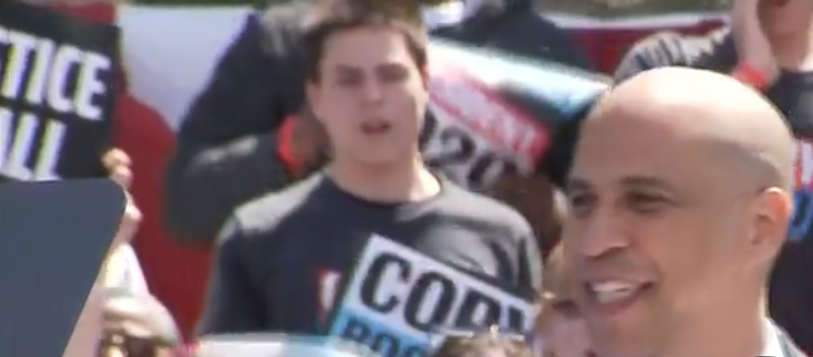Based on Pete Buttigieg’s Surge, Did Cory Booker Really Need the U.S. Senate?
Listen to audio version of this article

Standing in an old converted Studebaker factory in South Bend, Indiana, Mayor Pete Buttigieg made his case for the presidency in part by emphasizing hometown service as a major asset, a day after U.S. Senator Cory Booker (D-NJ) launched his own prez campaign in Newark, mostly using another kicked around old factory town as a set-piece for his powers to revivify America.
The singular difference between the two Rhodes scholars turned every man emblems in the embers of their respective forgotten cities was that Buttigieg is still the mayor of his, while Booker - apparently in search of foreign policy credentials and a more expansive demonstration of power potential - left the Newark mayoralty in 2013 to ensnare a senate seat.
The question now, as both men pursue the presidency, is whether Buttigieg, at 9% to Booker's 3% in the latest Monmouth University Poll, and posting $7 million in first quarter fundraising to Booker's $5 million - saved himself the trip of a dusty tour of duty in the cloakrooms of the U.S. Senate by simply staying locally grounded in a Trump-insane environment.
Certainly, the fact that the South Bend Mayor served as a naval officer in Afghanistan gives him that little bell to ring whenever someone asks him about foreign policy, which Booker - who didn't serve in the military - didn't have as he scouted an upwardly mobile political exit from Newark. Now, as a U.S. Senator, Booker does have international credentials to make him more than just a local mayor who wants to be president.
But as the chairman of the Ohio Democratic Committee notes the capacities of both Booker and Buttigieg to connect with voters in the country's second tier cities, the South Bend brand is bullishly ramrodding the local message from his sitting bully pulpit of that city.
"When the rest of the press called us a dying city we took that as a call to arms,' Buttigieg said today. "Studebaker would never come back, but our city would if we had the courage to re-imagine our future, and now I can confidently say, South Bend is back."
He gave a nod to how audacious it appears for him to run for president as merely a mayor.
"But we live in a moment that compels us to act," he said. "They call me 'Mayor Pete.' I'm a proud son of South Bend, Indiana, and I am running for president of the United States."
He seemed intent on drilling the narrative all afternoon.
Two other big city mayors addressed the crowd.
"It's places like my city where real democracy is forged," said Sacramento Chris Cabaldon.
"It's local government where government works best," said Austin Mayor Steve Adler. "When we flip the switch, power needs to come on. When we turn the faucets, clean water needs to come out of our spigots.
"In cities, political issues are not abstract," Adler added.
In his own kickoff, in front of his own cheering throng of millennial backers, Booker used the city of his personal story to reinforce the central argument of his campaign, arguably the abstract concept of love.
"The mayor was right," Booker proclaimed, in a nod to sitting Mayor Ras Baraka. "This community taught me all about that love."
Booker spent considerable time in his speech on Newark, New Jersey's largest city, and considerably less time on New Jersey, the bigger, politically dysfunctional framework of Newark. "New Jersey," said NJ's junior senator, "when you sent me to Washington as your senator, I brought those lessons with me."
The love bug candidate reserved his toughest talk for the National Rifle Association (NRA), vowing to fight the gun lobby while bucking up those medium-sized cities that both he and Buttigieg claim as their special province of influence: Pittsburgh, said Booker, Parkland, Charleston.
Certainly, Booker at a CNN town hall already fended off question about his support for charter schools while he was mayor. In his case, federal service at the very least in a progressive-aggressive Democratic Primary gave him a chance to put distance on that part of his local record. "We will fully fund public schools," said the senator at his kickoff. "Public school teachers will get the pay increases they deserve."
It's still early, of course, and no spellbinding divide separates the surging Buttigieg from Booker in the polls, or in fundraising. The case can be made that the Hoosier's age (37) more than anything puts him on better footing with millennial voters than the 50-hovering Booker, or that his precision of language - and seeming ability to eschew too many cliches - connects in a unique way. But as the field jockeys and each Democrat tries to use his or her record as a distinguishing feature, these two will fight for the forgotten cities, and one will claim to have the fortification of that story in real time, while the other will argue - as he did at his kickoff - that no other senator goes home to an inner city, and takes that hurt, pride, and aspiration to the national debate in Washington, D.C.





